- Serbia
Get to know Serbia
- Citizens
Culture and science
Health services
Pension and disability insurance
- Business
Employment
Economy
- Media
- Government
- Contact
Keep in touch
Contact form
Back
Keepin touch
Whether you have a question, comment, suggestion or any problem in the purview of the government, send us your message and we will try to respond as soon as possible. If your problem is not in our purview, we will forward your message to the relevant institution.
Q:
A:
IMF to approve arrangement with Serbia on May 15
Belgrade,
14 May 2009
Deputy Prime Minister and Minister of Economy and Regional Development Mladjan Dinkic today stated that the IMF will approve a €3 billion loan arrangement to Serbia on May 15, which will ensure macroeconomic stability over the next two years.
Following a lecture he gave to students of the Economics, Finance and Administration Faculty Dinkic told the press that the funds granted by the IMF will guarantee macroeconomic stability, a stable currency and security for the entire Serbian economy.
He said that Serbia needs the arrangement to regain lenders’ trust in its economy and maintain the 2008 level of investment.
He noted that the mere announcement of the loan positively affected the foreign currency market and stopped fluctuations, adding that the €3 billion arrangement will considerably increase Serbia’s foreign currency reserves.
Bear in mind the fact that we have far greater foreign currency reserves than the dinar mass and therefore have safety and stability, which is of huge importance, noted Dinkic.
He recalled that agreement was reached in Vienna with the ten largest foreign banks on the continuation of loan arrangements, which is a most important condition in overcoming the crisis.
The Minister noted that Serbia’s main problem is the fact that at one moment banks stopped providing loans, adding that it is of importance that banks continue providing them as before, as well as citizens continue to apply for those loans.
Apart from subsidising consumer loans, we decided to enable businesspeople to take loans under favourable conditions, explained Dinkic, adding that from May 18, businesspeople will be able to apply for loans with an annual interest rate of 3% or 10%.
He said that Serbia’s tight monetary policy is expected to ease thanks to the programme with IMF, noting that our problem is not external but internal non-liquidity.
The Minister explained that the liquidity of the Serbian economy will be achieved by providing cheaper money and conducting a more expansive monetary policy, noting that all monies from the National Bank of Serbia will be set aside for the Serbian economy.
According to Dinkic Serbia has been investing in its infrastructure, agriculture and other fields and, due to the bankruptcy of certain foreign companies, some Serbian enterprises now have much more work, such as the Sevojno Copper Rolling Mill.
Dinkic said time will show that Serbia has overcome the crisis better than other countries in the region, giving as an example the fact that Serbia asked the IMF for a €3 billion loan, while Hungary will receive €20 million from them.
He said that Serbia needs the arrangement to regain lenders’ trust in its economy and maintain the 2008 level of investment.
He noted that the mere announcement of the loan positively affected the foreign currency market and stopped fluctuations, adding that the €3 billion arrangement will considerably increase Serbia’s foreign currency reserves.
Bear in mind the fact that we have far greater foreign currency reserves than the dinar mass and therefore have safety and stability, which is of huge importance, noted Dinkic.
He recalled that agreement was reached in Vienna with the ten largest foreign banks on the continuation of loan arrangements, which is a most important condition in overcoming the crisis.
The Minister noted that Serbia’s main problem is the fact that at one moment banks stopped providing loans, adding that it is of importance that banks continue providing them as before, as well as citizens continue to apply for those loans.
Apart from subsidising consumer loans, we decided to enable businesspeople to take loans under favourable conditions, explained Dinkic, adding that from May 18, businesspeople will be able to apply for loans with an annual interest rate of 3% or 10%.
He said that Serbia’s tight monetary policy is expected to ease thanks to the programme with IMF, noting that our problem is not external but internal non-liquidity.
The Minister explained that the liquidity of the Serbian economy will be achieved by providing cheaper money and conducting a more expansive monetary policy, noting that all monies from the National Bank of Serbia will be set aside for the Serbian economy.
According to Dinkic Serbia has been investing in its infrastructure, agriculture and other fields and, due to the bankruptcy of certain foreign companies, some Serbian enterprises now have much more work, such as the Sevojno Copper Rolling Mill.
Dinkic said time will show that Serbia has overcome the crisis better than other countries in the region, giving as an example the fact that Serbia asked the IMF for a €3 billion loan, while Hungary will receive €20 million from them.
-
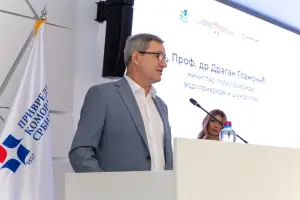 Belgrade, 11 August 2025
Belgrade, 11 August 2025Support for agricultural projects worth RSD 750 million
-
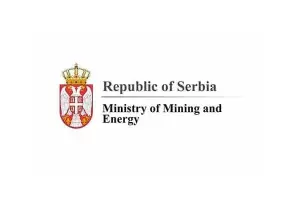 Belgrade, 21 July 2025
Belgrade, 21 July 2025Construction of oil pipeline with Hungary to begin early next year
-
 Belgrade/Athens, 17 July 2025
Belgrade/Athens, 17 July 2025Serbia continues to align with EU in field of energy
-
 Kostolac, 14 July 2025
Kostolac, 14 July 2025First solar power plant Petka in Kostolac put into trial operation
-
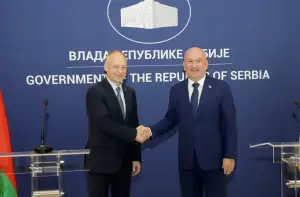 Belgrade, 11 July 2025
Belgrade, 11 July 2025Potential for improving cooperation with Belarus in many areas
-
 Požega, 5 July 2025
Požega, 5 July 2025Section of Pakovraće - Požega highway officially opened
-
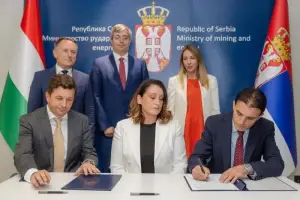 Belgrade, 2 July 2025
Belgrade, 2 July 2025Technical specifications defined for Serbia-Hungary oil pipeline
-
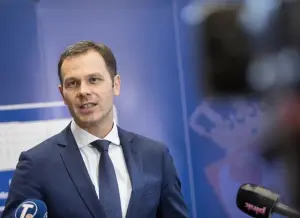 Belgrade, 30 June 2025
Belgrade, 30 June 2025IMF confirms Serbia successfully implementing all agreed reforms
-
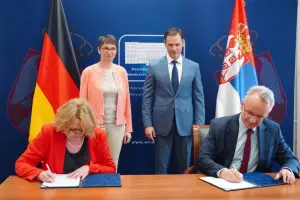 Belgrade, 27 June 2025
Belgrade, 27 June 2025Double Taxation Avoidance Agreement with Germany signed
-
 Kostolac, 25 June 2025
Kostolac, 25 June 2025Construction of Kostolac wind farm nearing completion
